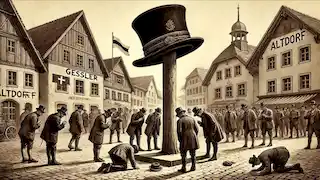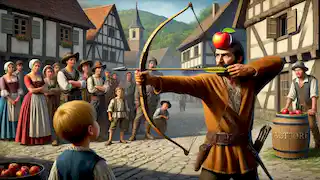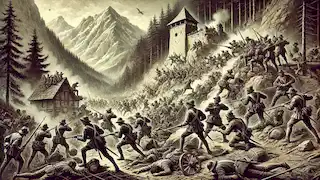The Legend of William Tell
Reading Time: 6 min

About Story: The Legend of William Tell is a Legend from switzerland set in the Medieval. This Dramatic tale explores themes of Courage and is suitable for All Ages. It offers Inspirational insights. A legendary tale of courage and resistance in medieval Switzerland.
In the heart of Switzerland, nestled in a picturesque valley surrounded by towering, snow-capped mountains, lies the quaint village of Altdorf. The cobblestone streets are lined with charming cottages, their wooden balconies adorned with vibrant flowers, and the crystal-clear lake reflects the serene beauty of the landscape. This idyllic setting is the backdrop for one of Switzerland's most enduring legends – the tale of William Tell. In the early 14th century, Switzerland was under the rule of the Habsburgs, a powerful family whose iron grip extended across much of Europe. The people of Switzerland, known for their fierce independence, chafed under the oppressive rule of Governor Hermann Gessler, the Habsburg-appointed tyrant. Gessler's rule was marked by arbitrary taxes, harsh punishments, and a disdain for the local traditions and freedoms that the Swiss held dear. To further humiliate the people, Gessler erected a tall pole in the central square of Altdorf and placed his hat atop it. He decreed that all who passed must bow to the hat as a sign of respect and submission to his authority. This decree was met with resentment and fear, but the villagers complied, knowing the severe consequences of defiance. William Tell, a skilled marksman and hunter from the nearby village of Bürglen, was known throughout the region for his exceptional prowess with a crossbow. Tell was a proud man, deeply committed to his family's freedom and the dignity of his fellow countrymen. He refused to bow to the hat, viewing it as a symbol of the unjust tyranny that plagued his homeland. One day, as Tell and his young son Walter traveled to Altdorf to visit the market, they passed by the pole with Gessler's hat. Tell, resolute in his defiance, walked by without bowing. A guard noticed this act of rebellion and immediately arrested Tell and his son, dragging them before Governor Gessler. Gessler, intrigued by Tell's defiance and reputation, devised a cruel punishment. He ordered Tell to shoot an apple off his son's head with his crossbow. Failure to comply would result in both their deaths. The governor's eyes gleamed with malice as he issued the challenge, eager to see the proud man tremble. Tell was horrified by the proposition but knew he had no choice. He loved his son deeply and would do anything to protect him. With a heavy heart, he agreed to the challenge. The townspeople gathered in the square, their faces a mixture of fear and anticipation, as Tell prepared for the most perilous shot of his life. William Tell steadied his hand and took aim. The world seemed to hold its breath as he focused on the apple balanced precariously on Walter's head. He whispered a silent prayer and released the bolt. The arrow flew straight and true, splitting the apple cleanly in two without harming his son. The crowd erupted in astonished cheers, and Gessler's face darkened with anger. Impressed but infuriated, Gessler demanded to know why Tell had prepared a second arrow. Tell responded boldly, "The second arrow was for you, should the first have harmed my son." Enraged by this declaration, Gessler ordered Tell to be imprisoned in his castle at Küssnacht. Bound and guarded, Tell was taken across Lake Lucerne by boat to the dungeon. As the boat sailed through a fierce storm, Tell seized an opportunity. The guards, distracted by the tempest, were unprepared when Tell leapt from the boat to a rocky outcrop, escaping their grasp. With a combination of skill and luck, he made his way to the shore and fled into the mountains. The news of Tell's daring escape spread quickly, igniting a spark of hope and rebellion among the Swiss people. They saw in Tell a symbol of resistance against the Habsburg oppression, and his actions inspired them to rise up and fight for their freedom. William Tell's escape and defiance became a rallying cry for the Swiss Confederates, a group of cantons united in their desire for independence. The people began to organize and prepare for a revolt against the Habsburgs. Tell himself became a key figure in this burgeoning movement, using his knowledge of the land and his skills to aid in the planning and execution of their strategy. The confederates launched a series of coordinated attacks on Habsburg strongholds, employing guerrilla tactics and leveraging their intimate knowledge of the mountainous terrain. These skirmishes were brutal and costly, but the Swiss fighters were driven by a deep-seated desire for freedom and justice. The conflict culminated in the Battle of Morgarten in 1315. The Swiss, heavily outnumbered and facing a well-armed Habsburg force, used their superior knowledge of the terrain to their advantage. They lured the Habsburg army into a narrow pass and launched a surprise attack from the high ground, raining down rocks and arrows. The Habsburg forces were thrown into disarray and suffered a crushing defeat at the hands of the Swiss. This victory was a turning point in the struggle for Swiss independence, demonstrating the effectiveness of their tactics and the unbreakable spirit of their people. William Tell's legend grew in the years following the Battle of Morgarten. He became a symbol of Swiss independence, courage, and the fight against tyranny. The story of his defiance, the impossible shot, and his role in the rebellion were passed down through generations, inspiring countless Swiss patriots. To this day, the tale of William Tell is celebrated in Switzerland. His legacy is honored in literature, art, and folklore, and the apple shot remains one of the most iconic moments in Swiss history. The village of Altdorf, where Tell's legend was born, stands as a testament to the enduring power of one man's courage in the face of oppression. William Tell's story transcends time and place, embodying the universal struggle for freedom and justice. His legend is a reminder that even in the darkest times, the actions of a single individual can inspire a nation and change the course of history. The picturesque Swiss village of Altdorf, with its charming cottages and serene lake, remains a beacon of hope and resilience, a place where the spirit of William Tell lives on.The Oppression

The Refusal
The Challenge
The Shot

The Escape

The Rebellion
The Battle of Morgarten

The Legacy
Epilogue: The Symbol of Freedom

















